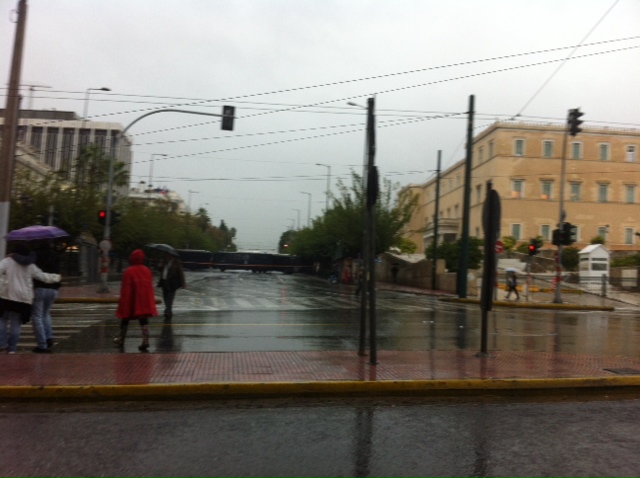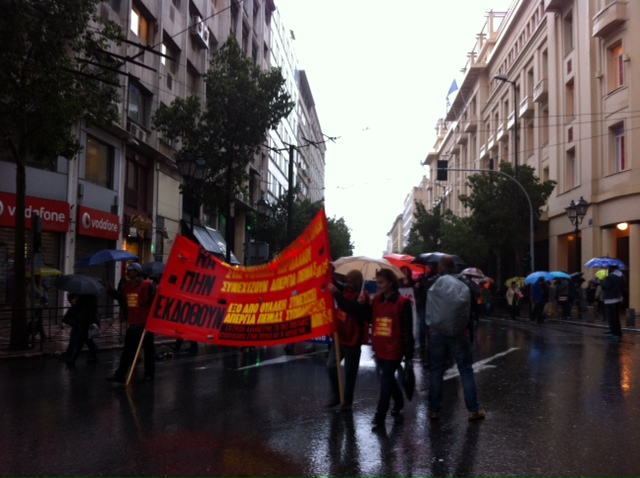Anastasia Balezdrova
Pouring rain and low participation marked the two protest processions held within the context of the 24 -hour strike announced by the main trade unions in Greece, ADEDY and GSEE.
Despite the bad weather, the members of the communist trade union PAME responded to the call for protest against the government policy and, according to various assessments, they numbered between 5,000 and 10,000. The participants in the protest set off from Omonia Square, went along Stadiou Street to get to Syntagma Square, where they scattered.

Minutes later, it started pouring in Athens, which forced the leadership of the trade unions of public sector employees ADEDY and of private sector employees GSEE to cancel the protest organised by them.
For about an hour, the streets around the parliament were empty. Reporters, camera operators and photographers were sheltering under the balconies of the buildings and some of the policemen guarding the parliament used their shields to protect themselves from the pouring rain.
However this did not stop about 3,000 people protesting under umbrellas and raincoats. They shouted slogans against the budget cuts, the government and the Troika. The protesters passed by the parliament; some of them remained outside it for about an hour and then left. The strike passed without incidents and clashes, and at 2:00 pm, the traffic in the centre of Athens was completely restored.

Meanwhile, despite the protesters’ calls to go home, the members of the supervisory Troika are continuing their talks with the Greek ministers. Government sources assess as positive the first meetings between the lenders and members of the cabinet, adding that the negotiations will not be completed any time soon.
In connection with the budget gap for 2014, which will be around 2.5 billion euro, as forecasted by the Troika, the Greek government presented the revenue data for the period January - September 2013, which exceeded expectations. The government hopes that a consensus can be achieved and that the measures required by the Troika for next year could amount to about 1 billion euro.
Regarding the other major factor for the payment of the next tranche of the loan, namely the Greek arms industry, the government claims that it can be saved through production on the basis of orders from abroad. In statements to the media, Finance Minister Yiannis Stournaras said that the three arms companies would have to seek to produce for export, thus indicating the main argument of the Greek government. Parallel to this, he admitted that the European Commission had rejected this proposal a few days earlier but, in his opinion, this was part of the negotiations on the subject.
According to naftemporiki.gr, the Greek government is preparing to submit for voting a legislative act under which the Greek arms industry will be able to acquire a new tax number, after it has been deprived of its former one. The goal, at least initially, is for the state to pay the amounts due in order for the employees to receive their salaries that have been delayed for months. According to the media sources, the tax number will be valid for one month. They define the procedure as formal and claim that it has nothing to do with the final decision on the fate of the company.
Regarding the other major issue, namely the financing needs of the insurance funds, sources from the Ministry of Employment and Social Security state that the opinion of the Troika differs from the proposals of Minister Yiannis Vroutsis. The only information from the meeting is that there will be further consultations with the technical teams of the lenders’ representatives aiming to optimize the collection of contributions on the part of the funds.